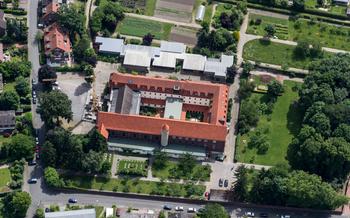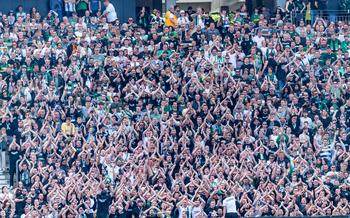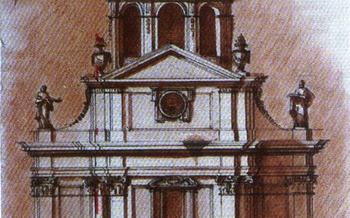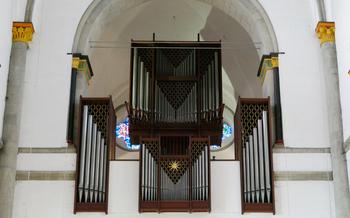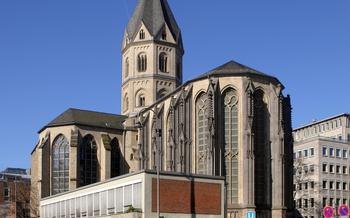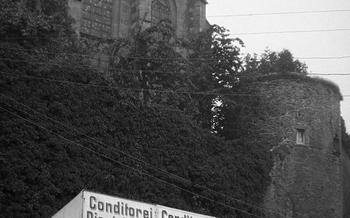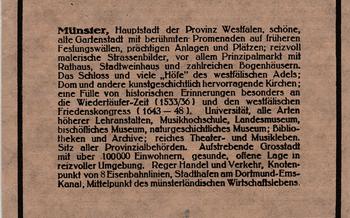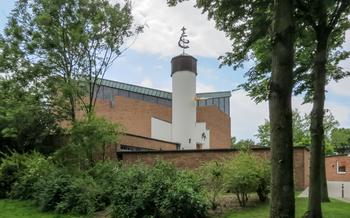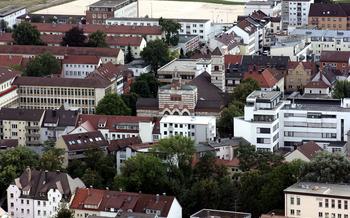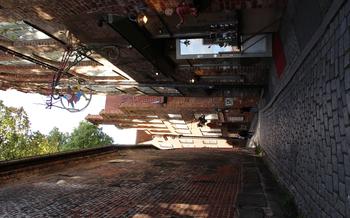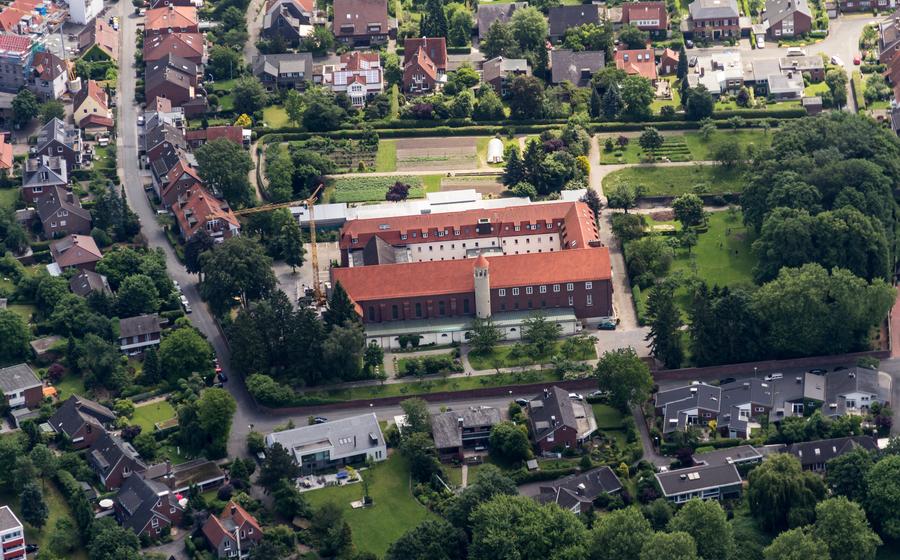
Kapuziner Kirche Münster
- Historical Significance
- Architectural Features
- Altarpiece and Stained Glass Windows
- Crypts and Tombs
- Capuchin Museum: A Journey into the History of the Capuchin Order
- Guided Tours: Enrich Your Experience with Expert Insights
- Events and Concerts
- Pilgrimage Site
- Religious Significance
- Opening Hours and Admission:
- Photography and Videography
- Accessibility for Disabled Visitors
Historical Significance
The Kapuziner Kirche Münster, a magnificent 17th-century Capuchin monastery, stands as a testament to the rich history and spiritual heritage of Münster, Germany. Step into this sacred space and be transported back in time as you explore the lives of the devoted Capuchin friars who once resided within its walls. Discover the historical events and cultural influences that shaped the church's development, making it a significant historical monument and a source of inspiration for generations.
Architectural Features
The Kapuziner Kirche in Münster, Germany, stands as a testament to the harmonious blend of Gothic and Baroque architectural styles. Its exterior boasts intricate details that captivate the eye, including gables adorned with delicate tracery, buttresses that lend a sense of strength and stability, and an elaborate portal that invites visitors into a realm of spiritual contemplation. Inside, the church's single nave is characterized by soaring vaulted ceilings that create an awe-inspiring sense of space. The ornate altars, with their intricate carvings and gilded embellishments, serve as focal points of devotion and artistic expression. Every element of the Kapuziner Kirche's architecture contributes to its unique character, making it a masterpiece of religious and artistic heritage.
Altarpiece and Stained Glass Windows
The Kapuziner Kirche boasts a stunning altarpiece, a masterpiece of Baroque art that serves as a visual testament to the life and teachings of St. Francis. Crafted with intricate detail, the altarpiece depicts various scenes from the saint's life, including his encounter with the leper, his sermon to the birds, and his receiving the stigmata. The vibrant colors and expressive figures bring the stories to life, inviting viewers to contemplate the profound significance of St. Francis's journey.
Complementing the altarpiece are the church's beautiful stained glass windows, which cast a kaleidoscope of colors onto the interior. These windows tell their own stories, depicting biblical scenes, saints, and symbols of faith. The interplay of light and color creates a mystical ambiance, enhancing the spiritual atmosphere of the church and inspiring visitors to reflect on the divine.
Crypts and Tombs
Beneath the Kapuziner Kirche lie fascinating crypts and tombs, offering a glimpse into the lives and deaths of those associated with the church. These burial chambers hold the remains of Capuchin friars, benefactors, and notable figures from Münster's history.
Explore the intricate tombs and memorials that adorn the crypts, each telling a unique story. Discover the resting place of the church's founder, Father Laurentius von Brindisi, and learn about his role in establishing the Capuchin order in Münster.
The crypts provide a tangible connection to the past, allowing visitors to contemplate the lives and legacies of those buried within. Reflect on the spiritual significance of these underground spaces, where prayers and rituals have been performed for centuries.
Uncover the cultural and religious practices associated with these tombs, such as the tradition of burying friars in simple habits without coffins, a testament to their vow of poverty.
Delve into the history of the crypts and tombs, and gain insights into the lives of the Capuchin friars who dedicated their lives to serving the community and spreading the Catholic faith.
Capuchin Museum: A Journey into the History of the Capuchin Order
Within the walls of the Kapuziner Kirche lies a treasure trove of history and spirituality—the Capuchin Museum. This fascinating museum offers visitors a glimpse into the life and work of the Capuchin friars, a branch of the Franciscan order known for their dedication to poverty, humility, and service.
The museum's collection is a testament to the rich heritage of the Capuchin order. Artifacts, documents, and artwork from centuries past tell the story of the Capuchins' founding, their missions around the world, and their enduring impact on society. Interactive exhibits and displays bring to life the daily lives of the friars, their struggles, and their triumphs.
Visitors can explore the museum at their own pace, learning about the Capuchins' unique charism and their contributions to the Catholic Church. From their humble beginnings in 16th-century Italy to their present-day work in over 100 countries, the Capuchins have left an indelible mark on the world.
The Capuchin Museum is not just a place of historical interest but also a source of inspiration and reflection. It invites visitors to consider the values that have guided the Capuchins for centuries—values of simplicity, compassion, and service to others. Whether you are a history buff, a spiritual seeker, or simply curious about the life of religious orders, the Capuchin Museum is a must-visit destination in Münster.
Key Takeaways:
- The Capuchin Museum offers a unique insight into the history and spirituality of the Capuchin order.
- Interactive exhibits and displays bring to life the daily lives of the Capuchin friars.
- The museum showcases the Capuchins' founding, their missions around the world, and their enduring impact on society.
- Visitors can explore the museum at their own pace, learning about the Capuchins' charism and their contributions to the Catholic Church.
- The Capuchin Museum is a place of historical interest, inspiration, and reflection for visitors of all backgrounds.
Guided Tours: Enrich Your Experience with Expert Insights
To fully appreciate the intricate details and rich history of the Kapuziner Kirche, consider joining a guided tour. These tours provide an immersive experience, as knowledgeable guides lead you through the church's sacred spaces, sharing captivating stories and insights.
Various tour options are available, catering to different interests and schedules. Regular group tours are ideal for those who want to explore the church in the company of fellow visitors. Private guided tours offer a more personalized experience, allowing you to tailor the tour to your specific interests and pace. Themed tours, such as those focusing on the church's architecture or religious significance, provide an in-depth exploration of specific aspects of the Kapuziner Kirche.
Guided tours offer several benefits. First, they provide access to exclusive areas of the church not typically open to the public. This may include the sacristy, where the priests prepare for mass, or the crypts beneath the church, where the Capuchin friars are buried. Second, the guides' expertise brings the church's history and significance to life, helping you understand the symbolism and stories behind the artwork, architecture, and rituals.
To book a guided tour, contact the Kapuziner Kirche directly or through a reputable tour operator. Tours are typically offered in German and English, with other languages available upon request. Advance reservations are recommended, especially for group tours or during peak tourist season.
Events and Concerts
The Kapuziner Kirche, with its exceptional acoustics and awe-inspiring atmosphere, serves as a captivating venue for a variety of events and concerts throughout the year. Classical music enthusiasts can indulge in the harmonious melodies of chamber concerts, while organ recitals showcase the grandeur of the church's historic organ. Visitors can also experience the uplifting sounds of Gregorian chant during special religious services. Beyond sacred music, the church occasionally hosts secular events such as theater performances, poetry readings, and art exhibitions, transforming the sacred space into a vibrant cultural hub. Whether seeking spiritual solace or artistic inspiration, attendees are sure to be captivated by the unique experiences offered at the Kapuziner Kirche.
Practical Tips:
- Check the church's official website or local event listings for upcoming events and concert schedules.
- Advance ticket purchase is recommended for popular events to avoid disappointment.
- Dress appropriately, respecting the religious nature of the venue.
- Arrive early to secure a good seat and soak in the church's tranquil atmosphere before the event begins.
Pilgrimage Site
The Kapuziner Kirche holds a special significance as a pilgrimage site for Catholics. Throughout history, people from near and far have flocked to this sacred place seeking spiritual guidance, healing, and solace. The church's reputation as a place of miracles and divine intervention has attracted pilgrims from all walks of life.
Pilgrimages to the Kapuziner Kirche often involve rituals and traditions that have been passed down through generations. Pilgrims may light candles, offer prayers, and leave offerings as a symbol of their devotion. The church's peaceful atmosphere and the presence of the Capuchin friars create a welcoming and supportive environment for those seeking spiritual renewal.
For many pilgrims, the journey to the Kapuziner Kirche is a deeply personal and transformative experience. They come with heavy hearts, seeking comfort and strength during difficult times. Through prayer, reflection, and the support of the Capuchin friars, pilgrims often find solace and a renewed sense of hope.
The Kapuziner Kirche stands as a testament to the power of faith and the enduring human spirit. It continues to be a beacon of hope and inspiration for pilgrims seeking spiritual guidance and healing.
Religious Significance
The Kapuziner Kirche holds profound religious significance as a sacred space for worship and devotion. It serves as a central hub for the Catholic community in Münster, offering daily mass schedules and various religious services. The church is home to the Capuchin friars, who play a crucial role in providing spiritual guidance, counseling, and support to the community. Their presence adds to the spiritual atmosphere and sense of community experienced by visitors and parishioners alike. The Kapuziner Kirche is a place where believers can come together to pray, reflect, and seek spiritual growth, finding solace and inspiration within its hallowed walls. The church's religious significance extends beyond its physical structure, embodying the essence of faith and spirituality for generations of Catholics in Münster.
Opening Hours and Admission:
The Kapuziner Kirche and Capuchin Museum welcome visitors during specific hours to ensure the preservation of their sacred spaces. The church is generally open from Monday to Saturday, with varying opening times. On Sundays, it remains closed, allowing for religious observances and private reflection. During holidays, such as Christmas and Easter, the opening hours may differ, so it is advisable to check the church's official website or contact them in advance for accurate information.
Admission to the Kapuziner Kirche is free of charge, allowing all visitors to experience its spiritual and historical significance without financial barriers. However, donations are gratefully accepted to support the ongoing maintenance and preservation of this cherished landmark. The Capuchin Museum, housed within the church complex, charges a modest entrance fee to cover operational costs and contribute to the museum's educational initiatives. Concessions and discounts are available for students, seniors, and groups, making it accessible to a diverse range of visitors.
To fully immerse oneself in the church's tranquil atmosphere and avoid crowds, it is recommended to visit during the week, especially in the morning hours. This allows for a more intimate and contemplative experience, enabling visitors to connect with the sacred space without distractions.
Photography and Videography
The Kapuziner Kirche welcomes photography and videography for personal use, allowing visitors to capture the church's beauty and share their experiences with others. However, certain guidelines must be followed to ensure respect for the sacred space and privacy of others.
Flash photography and the use of tripods are generally not permitted inside the church to minimize distractions during religious services and to protect the delicate artwork and artifacts. Visitors are encouraged to use natural light or low-light photography settings to capture the church's grandeur without disturbing the atmosphere.
When photographing or filming, visitors should be mindful of other visitors and avoid obstructing their views or capturing them in their shots without their consent. It is essential to maintain a respectful distance from the altar and other sacred areas during religious ceremonies.
The Kapuziner Kirche encourages visitors to share their photos and videos on social media, using specific hashtags to connect with a broader community and promote the church's heritage. By sharing their experiences, visitors can contribute to the ongoing appreciation and preservation of this remarkable historical and religious landmark.
Accessibility for Disabled Visitors
The Kapuziner Kirche is committed to providing an inclusive and welcoming environment for all visitors, including those with disabilities. To ensure a comfortable and accessible experience, the church has implemented several features to accommodate the needs of disabled guests.
Wheelchair ramps and elevators are available at designated entrances, allowing easy access to the church's interior. Once inside, visitors will find designated seating areas with ample space for wheelchairs. Accessible restrooms are also available within the church premises.
The church staff is always ready to assist disabled visitors with any additional needs or requests they may have. They can provide information on accessible routes, directions, and any necessary assistance during their visit.
The Kapuziner Kirche's commitment to inclusivity extends beyond physical accessibility. The church aims to create a welcoming and supportive atmosphere where everyone feels respected and valued, regardless of their abilities or limitations.
